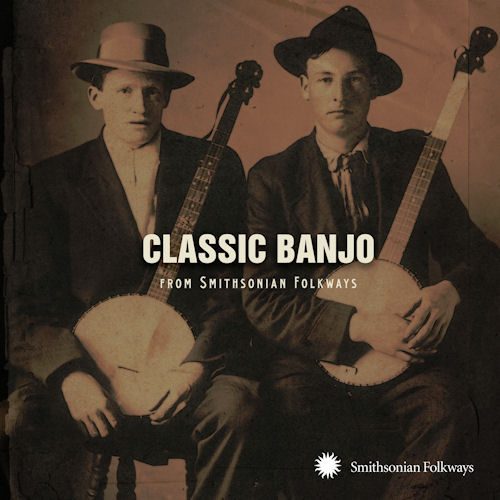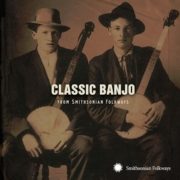CLASSIC BANJO FROM SMITHSONIAN FOLKWAYS PREVIEW
Bulletin: Smithsonian Folkways
Denies Security Leak
Will Release Classic Banjo Tapes
 An obscure provision of the Patriot Act has been triggered to force Smithsonian Folkways record company to release 30 major tracks from its secret tapes of vintage banjo music by some of America’s most notorious un-Americans—like Pete Seeger and his late half-brother Mike, who once described his banjo style as “non-violent,” which raised some red flags over at the NSA’s sister agency—the NCA—the National Clawhammer Association.
An obscure provision of the Patriot Act has been triggered to force Smithsonian Folkways record company to release 30 major tracks from its secret tapes of vintage banjo music by some of America’s most notorious un-Americans—like Pete Seeger and his late half-brother Mike, who once described his banjo style as “non-violent,” which raised some red flags over at the NSA’s sister agency—the NCA—the National Clawhammer Association.
It is no accident that Smithsonian Folkways—with its long history of promoting Marxist minstrels like Woody Guthrie (who condemned private property in his controversial “patriotic” song This Land Is Your Land), Leadbelly (he of the infamous Bourgeois Blues pointing out that Washington DC was racially segregated), and Mr. Seeger himself, who was an unfriendly witness before the House Un-American Activities Committee in 1955, when he hid behind the First Amendment and brazenly told them “You have no right to ask any American these questions”—is caught up in Washington’s latest scandal.
Faced with mounting criticism over its recent release of Jewish banjo player Stephen Wade, (whose nomination by the National Academy of Recording Arts and Sciences Grammy voters wisely ignored in giving its folk award to classical cello player Yo Yo Ma) Smithsonian Folkways finally announced that it would comply with the NSA order: Release or Recant.
But in typical Folkways style—carrying on for its suspect founder Moses Asch (whose very first release was of the ex-con Leadbelly—singing children’s songs no less)—Smithsonian Folkways picked Hiroshima Day, August 6, 2013 to release their new album Classic Banjo from the Smithsonian Folkways vaults. My late friend “Banjo Fred” Starner (unfortunately not on the album) would have appreciated the irony, especially since he too was born on August 6, and dedicated his life to singing out for peace, justice and the environment. However Fred, the Hobo Minstrel’s mentor Pete Seeger is on the album, and his motto, stenciled on his banjo head does speak to the concerns associated with that haloed name: “This Machine Surrounds Hate and Forces It to Surrender.”
So in all seriousness let us begin by noting that had Pete’s motto—from a World War II veteran—framed Truman’s military policy perhaps the eight-year old girl Sadako would not have had to die from leukemia brought on by radiation poisoning within a year of the Atom Bomb that killed a quarter of a million people outright. Pete’s half-brother Mike Seeger—also on the album—may also have appreciated the irony since as already noted he often referred to his banjo style as “non-violent”—to distinguish it from Earl Scruggs’ bluegrass style, which was vastly more popular.
Needless to add that my political associations are not Smithsonian Folkways—and that they no doubt were oblivious to the historical connotations.
With the permission of FISA (the Foreign Intelligence Surveillance Act) I managed to hack into Smithsonian Folkways computer network and pull out the actual track listing for the benefit of the White House, the NSA, Fox News and FolkWorks readers. Compiled by Smithsonian Folkways archivist Jeff Place and ethnomusicologist Greg Adams it is available here for the first time, unless you go on Smithsonian Folkways web site, where you can also see it.
Classic Banjo from Smithsonian Folkways tracklist:
1. Fly Around My Blue-Eyed Girl / Cripple Creek / Ida Red / Old Joe Clark — Pete Seeger (2:35)
2. Banging Breakdown — Hobart Smith (1:17)
3. Johnson Boys — Frank Proffitt (1:41)
4. Peachbottom Creek — Wade Ward (1:24)
5. Coo Coo — Dink Roberts (2:10)
Josh Thomas’s Roustabout — Mike Seeger (2:38)
7. Jaw Bone — Willie Chapman (0:52)
8. Bright Sunny South — Dock Boggs (3:36)
9. Coal Creek March — Pete Steele (1:52)
10. Mississippi Heavy Water Blues — Josh Thomas (3:37)
11. Walk Light Ladies — Rufus Crisp (1:28)
12. Buck Creek Girls — Bill Cornett (1:00)
13. Gut Bucket Blues — Don Vappie (4:15)
14. Skylark / Roaring Mary — Mick Moloney (3:24)
15. St. Anne’s Reel / La Renfleuse Gorbeil — Ken Perlman (2:50)
16. Smokey Mokes — Roger Sprung (2:21)
17. Golden Bell Polka — A.L. Camp (2:25)
18. Banjoland — Tony Trischka with Bill Evans (3:00)
19. Sally Ann — Snuffy Jenkins (1:10)
20. Lonesome Road Blues — Roni Stoneman (1:12)
21. Fox Chase — Lee Sexton (0:56)
22. Hop Along Lou — John Tyree (1:08)
23. Cotton Eyed Joe — “Big Sweet” Lewis Hairston (1:23)
24. Foggy Mountain Top — Ola Belle Reed (2:29)
25. Rambling Hobo — Doc Watson (1:37)
26. Old Rattler — John Snipes (2:46)
27. Georgia Buck — Elizabeth Cotten (1:42)
28. I Wish to the Lord I’d Never Been Born — Irvin Cook (3:07)
29. Black Eye Susie — Roscoe Holcomb (1:24)
30. Bluegrass Breakdown — Bill Keith with Bill Monroe and The Blue Grass Boys (3:09)
The most startling fact about this track listing is its clear interracial bias, throwing black and white musicians onto the same recording, when everyone knows that while African-Americans invented the banjo, they no longer play it. So how did Smithsonian Folkways find these black musicians to record them before they disappeared? The same way they always have—by going out into the field and hunting them down like a good coon dog; many of these black tracks come from a previous long-buried Folkways album called Black Banjo Songsters of North Carolina and Virginia, including Dink Roberts, John Snipes, John Tyree and Lewis “Big Sweet” Hairston. Elizabeth Cotten also hails from North Carolina, and was not included on that album, but has her own recording. Is it any accident that she practically raised Mike Seeger when she was a maid in the Seeger household?
I think not. Those Commies always stuck together. Why he was still out promoting her when she was 90 years old, singing that finger-picking guitar piece Freight Train she claimed to have written when she was only 12 years old. No wonder she played left-handed upside down guitar and banjo—an old lefty—as President Nixon liked to say—right down to her pink panties.
On June 12—the 50th anniversary of Medgar Evers’ assassination—I first got wind of this integrationist propaganda with an email I managed to open from Smithsonian Folkways self-described “Marketing Intern,” Lydia Warren (no relation to the socialist senator from the liberal bastion of Massachusetts) bragging about their “mission statement” of “cultural diversity,” and how this collection demonstrates the international and multicultural significance of the banjo.
Americana fans beware, you thought the banjo was just an American instrument—indeed American as the cowboy and apple pie. Think again: in the hands of compilers and annotators Greg Adams and Jeff Place you will be taken on a cosmic journey and a wild ride, for “the history of the banjo stretches across a complex, international terrain, from West Africa and the Caribbean, to North America and around the world.”
Here we go again—more One-Worldism from the federal government, promoting the United Nations and its dubious allies.
So let me lay this out on Front Street: if you like your folk music in neatly bound containers, well-defined categories restricted by race, custom and national origin, this is not the album for you. For this is a mind-bending, genre-shattering and stereotype-busting collection; it is as American as the Freedom Rides, the Woolworth lunch-counter student sit-ins, the Selma-to-Montgomery March, the Civil Rights and Voting Rights Act.
Musicians like Doc Watson and Libba Cotton, Rufus Crisp and Dink Roberts, Frank Proffitt and John Tyree, Hobart Smith and John Snipes, and Dock Boggs and Lewis “Big Sweet” Hairston have played together from time immemorial; only record companies have kept them apart.
But not this record company: Smithsonian Folkways—ever since Folkways founder Moe Asch discovered a copy of John Lomax’s Cowboy Songs in a French bookstall after being told “America has no folk music” has carried a torch for interracial harmony and multicultural diversity that was instrumental in creating the Folk Revival of the 1960s. For those were the records musicians Roger Sprung, Tony Trischka, Bill Evans, Bill Keith and Ken Perlman grew up on.
And now they are on Folkways too—Smithsonian Folkways, black and white together, carrying it on just the way Gil Turner’s classic song asked them to.
We Shall Overcome. And come August 6, Happy Birthday, “Banjo Fred,” Starner, playing banjo up in Heaven now with Pete Steele, whose classic banjo instrumental Coal Creek March—all 1 minute and 52 seconds of it—would knock Yo Yo Ma’s socks off.
Ross will host Concert for Bangladesh
The Talking Stick, 1411 Lincoln Blvd in Venice
Thursday evening, August 1, 7:00 to 10:00pm.
It will include highlights from the original concert. Suggested donation is $10 plus one drink or food item to support the venue.
Ross will present Musical Legacy of the Great March for the 50th anniversary of the March on Washington (August 28, 1963)
Saturday afternoon at 2:00pm, August 31, 2013
Allendale Branch of the Pasadena Public Library 1130 S. Marengo Ave. 626-744-7260 (free and open to the public).It will also include songs leading up to the March from the 1963 Newport Folk Festival.
Ross will present his 33rd annual labor program.
Sunday morning at 10:15am, September 1, at The Church in Ocean Park, at 2nd and Hill in Ocean Park 310-399-1631 (free and open to the public).
Ross Altman may be reached at greygoosemusic@aol.com













